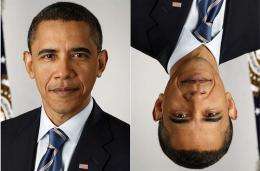Recognising flipped famous faces has links to mental health

(Medical Xpress) -- According to researchers from the University of Hertfordshire, individuals with the mental health problem Body Dysmorphic Disorder (BDD) cannot accurately detect negative facial emotions but they have an amazing ability to recognise famous faces - when they are upside-down.
Upside-down faces are difficult for most people to identify because we are used to processing them as a whole, and the right way up. Individuals with BDD, however, process the faces in a different way because they overly-focus on the individual facial features.
Professor Keith Laws, Professor of Cognitive Neuropsychology at the University said: “People with Body Dysmorphic Disorder have an obsession relating to their body image, where they believe that they have a defect in their appearance. Often they are attractive individuals who focus negatively on specific features of their own body, especially their face. Indeed, up to 15% of people who seek cosmetic surgery meet the criteria for a BDD diagnosis.”
The researchers found that because BDD patients focus on individual facial features rather than the whole face, this aids their ability to recognize inverted famous faces, for example they may be intimate with David Beckham’s eyes or Angelina Jolie’s lips. By contrast, they have difficulty recognising negative and threatening facial expressions because they may imagine that most other people are looking at them as critically as they view themselves.
BDD is estimated to affect one to two per cent of the population. Individuals with BDD engage with time-consuming compulsive behaviours such as mirror-checking, applying make-up to camouflage and seeking reassurance about their appearance. Professor Laws and colleagues are now looking at whether the super-recogniser abilities of BDD patients may act as a marker for the disorder and whether this advantage exists to a milder form in the relatives of those with BDD.
The paper will be published in the Journal of Obsessive-Compulsive and Related Disorders.














